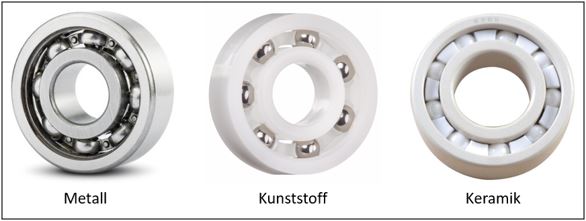Should ball bearings be greased?
Who does not know it? When installing metallic ball bearings grease or lubricating oil always remain on the fingers. But is it possible without it? Of course!
For example, with lubrication-free ball bearings made of plastic. Unlike metal, it is true that the high speeds above 5,000 rpm cannot be implemented, but only a few applications need to rotate with such incredible speed. Most applications are usually low load and low speed. Plastic ball bearings are always impressive when used in liquid media such as water or even chemicals. But even in applications with elevated temperatures up to 150°C, ball bearings made of plastic can be a better alternative. In addition, such bearings offer considerable advantages over metal in terms of easy movement. They run with significantly lower breakaway torque so that they do not have to overcome the resistance of the lubricant. In addition, they are very light, and on request are also available with glass balls and thus completely metal-free and non-magnetic.
Another lubrication-free alternative are ball bearings made of technical ceramics. Ceramic materials are generally very wear-resistant, corrosion-resistant, temperature-resistant, lightweight, rigid and electrically insulating – all qualities that are very beneficial for use in rolling bearings. Despite the significantly higher costs compared to metallic materials, such technical ceramics as silicon nitride, silicon carbide and aluminium oxide have established themselves as bearing materials since long. In many cases, however, for cost reasons, they have hitherto been used only in application areas in which the advantages of ceramics are really important and buyers are not deterred by the higher procurement costs.[1]
In contrast to the alternatives mentioned, metallic ball bearings must be lubricated. Without lubrication, these bearings would otherwise rust very quickly and deform by use due to the high frictional forces and the lack of cooling, resulting in the blockage of the bearing in the worst case. Lubrication is essential especially for sealed ball bearings, otherwise the plastic or rubber seals become porous, allowing the grease to leak and cause the bearing to operate dry. Although non-rusting stainless steel ball bearings do not corrode, they are much more expensive to purchase than plastic ball bearings.
[1] Source: https://www.maschinenmarkt.vogel.de/risiken-von-keramiklagern-werden-oft-ueberschaetzt-a-403943/

